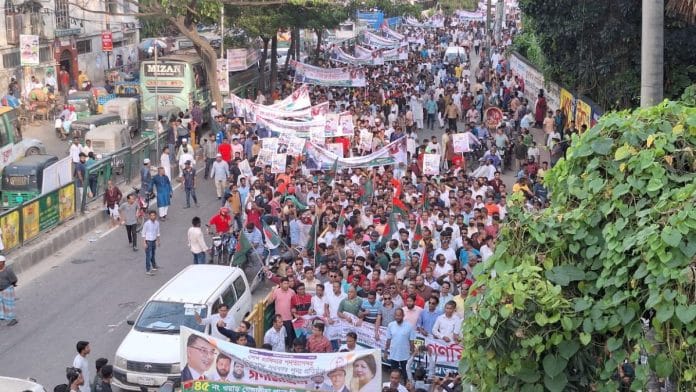Dhaka: As she watched images of buses being set on fire, policemen clashing with political activists, and cocktail bombs exploding on Dhaka streets on TV on 29 July, Purnima Rani Shil, 2001 gangrape survivor, felt sick to her stomach. Violence had exploded on the streets of Bangladesh after a sit-in protest against the Sheikh Hasina government by the country’s main Opposition party, the Bangladesh Nationalist Party.
The Dhaka Metropolitan Police told Bangladesh United News, that the BNP workers blocked all important roads in the capital and when the police tried to remove them to ease traffic movement, they started throwing stones at the police and their vehicles. They also set buses on fire and exploded cocktail bombs.
Talking to ThePrint, Shil said the run-up to the January 2024 general elections in Bangladesh has filled her with dread. A political change could bring back horrors of the past, the kind of horror she has not been able to get over 22 years after she was witness to it. And the violence on the streets of Bangladesh only makes it worse.
“If the BNP and the Jamaat come to power in Bangladesh again, I will have nowhere to go. I cannot go through what I went through in 2001,” she said.
Just before the 29 July violence, Tarique Rehman, BNP’s acting chief had told his party that “the fate of the country will be decided on the streets.”
“Democracy is not practised on the streets. Anarchy is. But Rehman wouldn’t know,” Shil said. Rehman’s message was also criticised by rights activists and minority community leaders.
Also Read: Awami League dismisses new US visa policy for Bangladesh — ‘US not guardian to world’
What happened to Shil?
A simple Google search of her name will bring up the ordeal Shil faced in 2001. “I was barely a teenager when they gang-raped me and destroyed my life. My story made international headlines but nobody bothered about the ordeal I faced after,” she said.
In 2001, the BNP and Bangladesh Jamaat-e-Islami-led coalition won the general election in Bangladesh. Post-election violence followed and Awami League supporters and members of religious minorities were the targets.
“I was a 12-year-old polling agent of the Awami League in Perba Delua in Sirajganj district. I had protested against electoral malpractices by the Bangladesh Nationalist Party workers during the election. After the results came out, my home was attacked by around 30-40 men on 8 October 2001. They tore my clothes and tied my face with a gamcha. I knew their voice; I could see their face in the light of their torch. They took me to a nearby field and raped me one after another until I lost consciousness,” Shil said.
In the attack, Shil said her sister lost her eyesight and her father’s salon was looted. Her family was forced to flee. Purnima came to Dhaka and members of the Awami League arranged for her treatment. She could never go back to her village again.
“I never became whole again. But whatever was left of me, whatever I could pick up of myself after they did what they did to me, I brought to Dhaka. Because the countryside was full of horrors, being Hindu can become a curse at the whim of a huzoor [a Muslim religious preacher] or the poisonous whisper of a neighbour,” she said.
The trial against her rapists started only after the Awami League returned to power in 2009. On 4 May 2011, 11 were sentenced to life for her gangrape and fined one lakh Bangladeshi taka each. Six of her rapists are in custody, while five men remain on the run.
“They could never catch the five who went into hiding after raping me. The ones who are in jail have appealed to the court for mercy. Their friends and relatives call me from private numbers and abuse me. They tell me I will be raped again when there is a change of government in Bangladesh. Sex videos using my name are circulated. Imagine what I feel when I see political violence in Bangladesh now that the general elections are almost here,” she said.
Also Read: Hindu havelis near Dhaka tell a story – of zamindars, oppression, Partition
The violence of 2001
Shil was only one of the many victims of post-poll violence in 2001, said Rana Dasgupta, general secretary of Bangladesh Hindu Buddhist Christian Oikya Parishad, the largest minority organisation in Bangladesh. “Over 28,000 incidents of looting, rape, burning down of places of worship and killing of minority leaders were reported back then. Even some Bangladesh and Jamaat political workers who later became ministers were found to be involved in the violence,” he told ThePrint.
He condemned Rehman’s recent message “It is deeply disturbing for minorities and everyone else who has a stake in democracy in this country. I am not surprised Purnima Rani Shil is affected by this.”
(Edited by Theres Sudeep)






